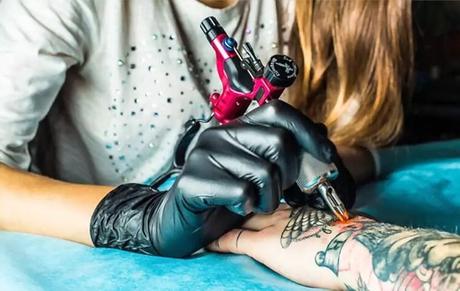
Inking a tattoo on any part of your body is not to be taken lightly. It can be a permanent imprint on the skin. Therefore, you must prepare yourself physically and mentally days before visiting the tattoo artist.
It is helpful to consider the following in preparation for your tattoo;
- Research your tattoo artist and their shop
- How to prepare and care for your skin before and after the tattoo
- What foods to avoid before getting a tattoo, and what foods nourish your skin
- Stay hydrated
A tattoo may be a permanent imprint. Therefore, preparing your body and mind is essential, especially if you’re getting a tattoo for the first time. If you are unsure how to prepare for your tattoo, here are a few handy tips for you to consider.
How To Prepare For A Tattoo?
There are a few ways to prepare yourself physically and mentally before you walk into a tattoo parlour. Please prepare your skin and body a few days before your visit. If you follow what’s listed below, you shouldn’t have any issues with your tattoo.
1. What To Consider When Selecting A Tattoo Design?
The decision to get inked shouldn’t be a hasty one. It should be well thought out and planned. After all, it will be on your person as long as you like. Therefore, you must meet with an experienced tattoo artist before getting inked to discuss the design, placement, size, and color.
In your initial consultation with your tattoo artist, you should clarify
- The tattoo design; would help the artist if you had an idea or an image of your design. In this way, the artist can create a mock-up for you. From this mock-up, they can advise you about placement and pricing.
- The colours of the design. Specific colours show out better on certain skin tones. For example, lighter skin tones better hold white, red, and purple pigments. And darker skin tones absorb the darker colours better, like crimson and royal blue. Many people prefer the greyscales because they show up better regardless of skin tone.
- The size and location of your tattoo. Your tattoo artist is knowledgeable and experienced enough to offer advice on the size and location of your tattoo. The size and location of your tattoo determine how long it takes before the colours and shape fade.
2. Selecting A Tattoo Shop And Artist
It is crucial to visit a few tattoo shops before you get inked. Consider the following when selecting a tattoo artist and shop.
- Ensure the tattoo artist and their shop has the proper licensing. Most prominent tattoo shops have their licenses displayed on their website. You can also request to see these from your tattoo artist.
- Hygiene is critical for any tattoo. You don’t want to get infected with nasty needles or other unsanitary practices.
- You want to trust and develop a good working relationship with your artist and rely on something other than their portfolio. They will, after all, be permanently inking you.
- A consultation with your tattoo artist relaxes you before your tattoo appointment, puts you at ease, and relieves some stress about getting inked.
3. How To Prepare Your Skin Before And After Your Tattoo?
It is well-known that smooth and hydrated skin absorbs ink pigments better than dry and cracked skin. Smooth skin also facilitates the inking process.
In preparation for your tattoo, you should find a good skin exfoliator. An exfoliator removes dead cells from the skin’s surface and stimulates blood circulation.
Weeks before you apply your tattoo, you should add a good moisturiser to your daily skin routine. Serums are considered a better choice than moisturisers. A moisturiser is good but leaves an oily film on the skin. In comparison, serums are more easily absorbed into the skin. However, on the day of your tattoo, you should not apply any moisturiser to your skin.
You may also use a tattoo care balm before and after you receive your tattoo. Tattoo balms are designed specifically to keep the skin supple and hydrated.
If the area is hairy, it is advisable to shave that area 2 or 3 times a week. You must be careful not to break the skin while shaving. Most tattoo artists will not ink an area with an open wound, even if the nick or cut is small.
You should stop shaving if you notice any skin irritations. It would be best to leave the shaving for the day of the tattoo or for the artist to do it.
In addition to exfoliating and moisturising, it is also best to use a sunscreen of approximately 30 SPF. The harsh sun’s rays dry out the skin. It is unpleasant to tattoo sunburned skin. Using sunscreen after your procedure prevents the tattoo from fading too quickly.
Your tattoo artist will advise you on a Numbing Cream For Tattoos. These creams will help you throughout your tattoo session.
4. Foods You Should Avoid In Preparation For Your Tattoo
Any dietician will tell you for healthy skin, you need to consume the right foods. Therefore in preparation for your tattoo, you should consume a balanced diet. Foods rich in Vitamins A, B, C, E, D, magnesium, and zinc are great immune boosters. They help your skin heal faster after the tattoo and prevent infections.
You should avoid those high in sugar, processed, and junk foods. Junk and processed foods are high in salt, which causes dehydration. That’s the last thing your skin needs!
Before your tattoo, you must also avoid alcohol, caffeine, and any drugs or painkillers. All these act as blood thinners, which cause excessive bleeding and prevent the tattoo from proper healing.
Conclusion
Getting a tattoo is a personal experience that you should feel comfortable with from start to finish, that’s why most people use a Tattoo Numbing Cream. In preparation for your tattoo, it is essential to research and ask questions if there are any areas you need clarity with. Then sit back and watch your tattoo artist create a masterpiece!

